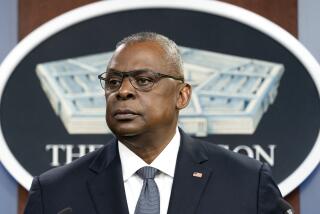No troop request in Afghanistan report, Gates says
WASHINGTON — An upcoming assessment of Afghanistan by the top U.S. commander there will not include a request for additional U.S. troops, Defense Secretary Robert M. Gates said Thursday.
But Gates did not rule out the possibility that the commander, Army Gen. Stanley A. McChrystal, might make such a troop request later. The report due after next week’s Afghan national elections is intended to assess conditions in the country and the effect of a new Obama administration security strategy.
Any request for more troops “will be considered separately and subsequent to his assessment,” Gates said.
There has been speculation for weeks about whether McChrystal would ask for more troops and whether President Obama would agree to bolster the force.
Obama ordered 21,000 additional troops last spring to bring the U.S. force in Afghanistan to 68,000 by the end of this year. About 30,000 international troops under NATO command are also deployed in Afghanistan.
Some military officials believe that more troops are needed if the U.S. and its North Atlantic Treaty Organization allies are to succeed in rolling back Taliban advances and protecting Afghan civilians.
Gates, however, said he was concerned that additional forces could fuel anti-U.S. sentiments, and that providing new troops would be “a challenge,” considering that U.S. forces are still stretched.
McChrystal is expected to call for an increasing focus on protecting the population and less on mounting individual attacks on suspected extremists.
Gates said Thursday that the security picture was “mixed.” He said it was impossible to predict how quickly the country could be stabilized, but he reiterated his belief that “we have to show progress over the course of the next year.”
Richard C. Holbrooke, the special envoy to Afghanistan and Pakistan, was asked a day earlier how the administration would define success in the region. Holbrooke compared the determination to former Supreme Court Justice Potter Stewart’s criterion for defining pornography by paraphrasing: “We’ll know it when we see it.”
At a session sponsored by the Center for American Progress, Holbrooke also said that he preferred the term “succeed” to “win” because the war “isn’t going to end on the battleship Missouri,” a reference to the ceremony that ended World War II. He begins a trip to the region today.
--
More to Read
Sign up for Essential California
The most important California stories and recommendations in your inbox every morning.
You may occasionally receive promotional content from the Los Angeles Times.











